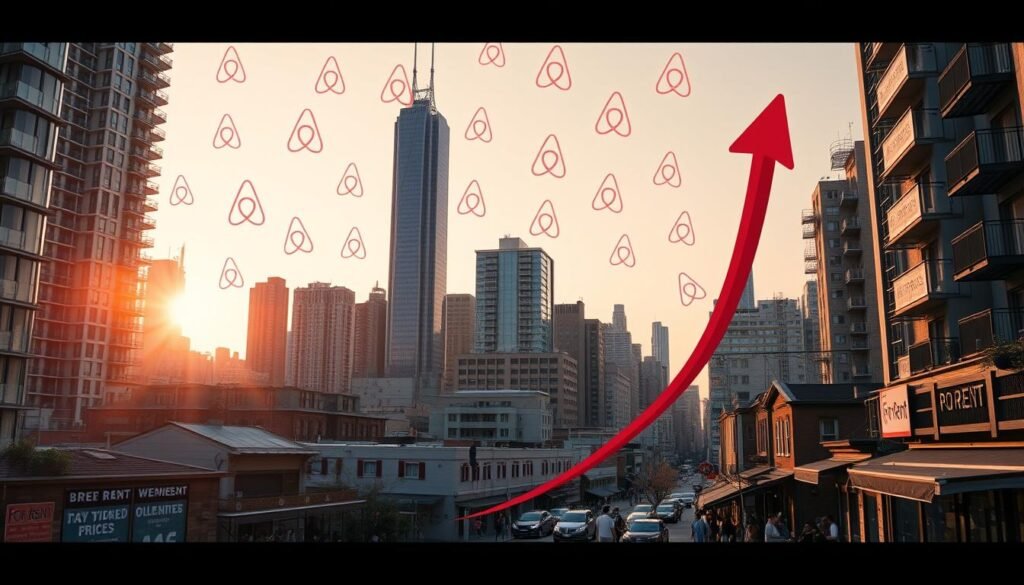In recent years, the rapid growth of Airbnb and other short-term rental platforms has sparked a heated debate surrounding their impact on urban housing costs. As the popularity of these platforms continues to rise, concerns have mounted over their potential to exacerbate affordability issues in major cities across the United States. This comprehensive analysis explores the relationship between Airbnb’s expansion and the escalating rental prices in urban areas, providing a detailed assessment of the factors driving this phenomenon in 2024.
The rise of short-term rentals has transformed the traditional housing landscape, with property owners increasingly opting to list their units on platforms like Airbnb rather than offering long-term leases. This shift has had a profound impact on the overall housing supply, as units that were once available for long-term occupancy are now being utilized for short-term, vacation-style rentals. The resulting decrease in the number of affordable housing options has inevitably contributed to the surge in rental prices, making it increasingly challenging for residents to secure suitable and affordable accommodations.
Furthermore, the influx of short-term renters has led to a phenomenon known as “neighborhood gentrification,” where the character and demographics of certain areas undergo significant changes. As Airbnb listings proliferate in these neighborhoods, the demand for housing often outpaces the supply, driving up prices and displacing long-term residents who can no longer afford to live in their communities.
This analysis delves into the complex economic factors at play, examining the supply and demand dynamics, the impact of urbanization, and the role of local economies in shaping the rental market. It also explores the regulatory responses adopted by cities, the perspectives of landlords and investors, and the reactions of the local community, providing a multifaceted understanding of the issue.
By analyzing the trends, challenges, and potential solutions surrounding Airbnb’s influence on urban housing costs, this report aims to offer policymakers, urban planners, and community stakeholders valuable insights to navigate the evolving landscape of short-term rentals and promote sustainable development in the years ahead.
Key Takeaways
- Airbnb’s rapid growth has contributed to the escalation of rental prices in urban areas, with short-term rentals reducing the overall housing supply.
- Neighborhood gentrification driven by the influx of Airbnb listings has displaced long-term residents, further exacerbating affordability issues.
- Complex economic factors, including supply and demand dynamics, urbanization, and local economies, have played a significant role in the rising rental prices.
- Cities have implemented various regulatory responses, but the impact on the rental market has been mixed, requiring a balanced approach.
- Landlords and investors have been drawn to the financial incentives of short-term rentals, but the local community has often voiced concerns over the negative impacts on affordable housing.
Introduction to Airbnb and Urban Housing Dynamics
As the vacation rentals market has continued to evolve, the rise of platforms like Airbnb has had a significant impact on urban rental markets and urban housing. Airbnb, a leading short-term rental platform, has disrupted the traditional hospitality industry and transformed the way people book and experience accommodations.
Overview of Airbnb's Business Model
Airbnb’s unique business model allows individual property owners to list and rent out their spaces, from entire homes to private rooms, to travelers seeking alternative accommodations. This peer-to-peer approach has provided greater flexibility and choice for consumers, while also offering property owners the opportunity to generate additional income from their assets.
Key Statistics on Airbnb Usage
- Airbnb boasts over 6 million listings in more than 100,000 cities worldwide, offering a diverse range of vacation rentals.
- The platform has hosted over 1 billion guest arrivals since its inception, demonstrating the growing demand for alternative rental market options.
- Airbnb’s global revenue reached nearly $6 billion in 2021, highlighting its significant impact on the urban housing and hospitality industries.
Purpose of the Analysis
This in-depth analysis aims to explore the intricate relationship between Airbnb’s growth and its influence on urban housing costs. By examining key trends, economic factors, and regulatory responses, the study seeks to provide a comprehensive understanding of how the rise of short-term rentals is shaping the rental market and the broader implications for urban housing.
The Rise of Short-Term Rentals
The growth of home-sharing platforms like Airbnb has significantly transformed the real estate landscape in recent years. These innovative home-sharing platforms have revolutionized the way people book and experience accommodations, leading to a surge in the popularity of short-term rentals.
Growth Trends in Short-Term Rentals
The Airbnb impact on the real estate market is undeniable. Data shows that the short-term rental industry has experienced exponential growth, with the number of active Airbnb listings worldwide reaching over 6 million in 2022, a remarkable increase from just 640,000 in 2013.
Comparison with Traditional Rental Market
In contrast to the traditional long-term rental market, the short-term rental sector offers a more flexible and lucrative option for property owners. Homeowners can earn significantly higher returns by listing their properties on home-sharing platforms, often earning more than they would from long-term tenants.
Reasons for Popularity
The rise of short-term rentals can be attributed to several factors, including the desire for unique and authentic travel experiences, the convenience of booking accommodations online, and the potential for property owners to generate additional income. Airbnb impact on real estate trends has been significant, as more homeowners and investors seek to capitalize on the lucrative short-term rental market.
| Year | Active Airbnb Listings Worldwide |
|---|---|
| 2013 | 640,000 |
| 2022 | 6,000,000 |
The table above clearly demonstrates the rapid growth in the number of active Airbnb listings worldwide, highlighting the significant Airbnb impact on the real estate trends and the rise of short-term rentals as a popular alternative to traditional accommodations.

Economic Factors Influencing Rental Prices
When it comes to understanding the dynamics of the housing market, particularly the rental market in urban areas, it’s crucial to examine the economic factors that influence rental prices. These factors play a significant role in the housing affordability challenges that many city dwellers face.
Supply and Demand Dynamics
One of the primary drivers of rental prices is the classic economic principle of supply and demand. In areas with limited housing supply and high urban housing demand, rental prices tend to rise as competition for available units increases. This imbalance can be exacerbated by factors such as population growth, job opportunities, and the desirability of a particular location.
Impact of Urbanization
The rapid pace of urbanization in many parts of the world has significantly impacted the rental market. As more people migrate to urban centers in search of employment and amenities, the demand for housing, particularly rental units, has skyrocketed. This increased demand, coupled with limited housing construction, has led to a surge in rental prices, making it increasingly challenging for lower-income individuals and families to find affordable housing.
Role of Local Economies
The strength and performance of local economies also play a crucial role in shaping rental prices. Thriving job markets, high-paying industries, and a robust tourism industry can all contribute to a high-demand for rental properties, driving up prices. Conversely, weaker local economies may experience slower rent growth or even declining rental rates, as the demand for housing decreases.
Understanding these economic factors is essential for policymakers, urban planners, and community leaders to develop effective strategies for addressing housing affordability challenges and ensuring that urban housing remains accessible to all segments of the population.

Airbnb's Influence on Housing Supply
The rise of short-term rentals, spearheaded by Airbnb, has had a significant impact on the availability and affordability of long-term housing in many urban areas. As property owners seek to capitalize on the lucrative short-term rental market, a growing number of rental units have been converted from long-term leases to short-term accommodations.
Converting Long-Term Rentals to Short-Term
This trend has led to a decrease in the overall housing supply, as units that were previously available for long-term residents are now being used for short-term rentals. The financial incentives offered by Airbnb have encouraged landlords and property owners to shift their focus toward the short-term rental market, often prioritizing higher-paying tourists over long-term tenants.
Neighborhood Gentrification Effects
The proliferation of short-term rentals has also contributed to the process of gentrification in many urban neighborhoods. As properties are converted to short-term rentals, the character and demographics of these communities can change, often leading to the displacement of long-term residents and the influx of wealthier, transient visitors.
Impact on Housing Diversity
The reduction in long-term rental options has also had a significant impact on housing diversity, limiting the availability of affordable housing and making it increasingly challenging for low-income and middle-class residents to find suitable accommodations. This, in turn, can lead to the homogenization of neighborhoods and the loss of the diverse cultural and socioeconomic fabric that often characterizes thriving urban communities.
| Metric | Impact of Airbnb |
|---|---|
| Long-term Rental Availability | Decreased |
| Neighborhood Gentrification | Increased |
| Housing Diversity | Decreased |
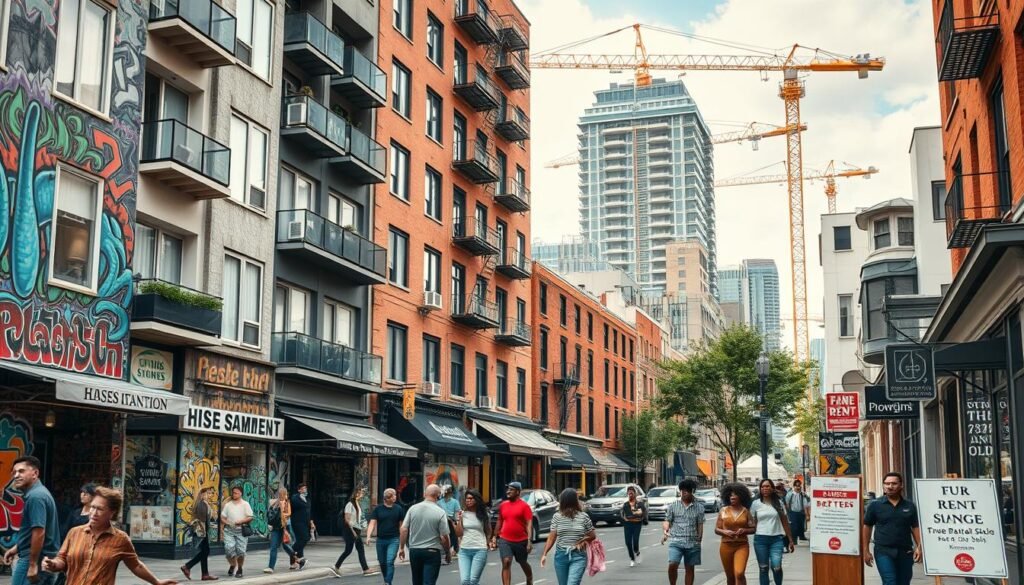
“The growth of short-term rentals has had a profound impact on the housing landscape in many cities, often exacerbating issues of affordability and accessibility for long-term residents.”
Case Studies: Cities Affected by Airbnb
As the vacation rentals market continues to evolve, certain urban hubs have found themselves at the center of debates over the impact of platforms like Airbnb on local housing dynamics. Let’s explore how three major cities – San Francisco, New York City, and Los Angeles – have grappled with the challenges posed by the rise of short-term rentals.
San Francisco: A Costly Debate
San Francisco, often considered the birthplace of Airbnb, has been embroiled in a contentious debate over the effects of vacation rentals on urban housing. The city’s limited housing supply and skyrocketing rental prices have led to concerns that Airbnb is exacerbating the affordable housing crisis by incentivizing property owners to convert long-term rentals into short-term vacation listings. This has sparked heated discussions around the need for stricter regulations to balance the interests of the vacation rental industry and the local community’s need for accessible, affordable urban housing.
New York City: Regulatory Challenges
New York City, a major tourist hub, has also grappled with the complexities of regulating the urban housing rental market in the face of Airbnb’s growth. The city has implemented a series of regulations, including limitations on the number of days a property can be rented out and requirements for hosts to register their listings. However, enforcement of these rules has proven challenging, with ongoing debates around the appropriate balance between supporting the vacation rental market and preserving affordable housing options for local residents.
Los Angeles: Market Fluctuations
In Los Angeles, the impact of Airbnb on the urban housing landscape has been more nuanced. While the city has seen a rise in vacation rental listings, the effects on rental prices have been more variable, with some neighborhoods experiencing significant increases while others have remained relatively stable. Los Angeles has taken a more measured approach, implementing regulations that aim to strike a balance between supporting the vacation rental industry and mitigating the potential negative impacts on housing affordability and availability.
These case studies illustrate the diverse challenges that cities face as they navigate the complex interplay between the vacation rental market and the broader urban housing landscape. Policymakers and community stakeholders continue to grapple with the need to foster economic development while preserving the accessibility and affordability of urban housing.
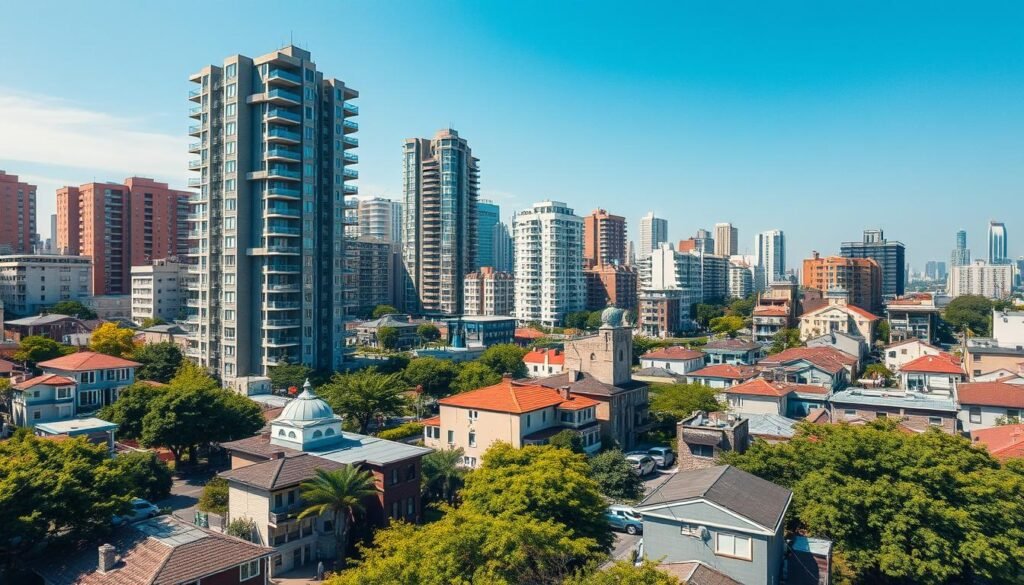
| City | Key Challenges | Regulatory Approach |
|---|---|---|
| San Francisco | Affordable housing crisis, conversion of long-term rentals to short-term listings | Stricter regulations, emphasis on balancing industry interests and housing affordability |
| New York City | Enforcement of regulations, balancing vacation rental market and affordable housing | Limitations on rental days, host registration requirements, ongoing regulatory debates |
| Los Angeles | Variable impact on rental prices, need to support vacation rental industry while mitigating housing challenges | Measured approach, regulations aimed at balancing economic development and housing affordability |
Rent Prices Before and After Airbnb Entry
As Airbnb’s presence has expanded across urban centers, a critical question has emerged: How has the platform influenced rental prices in the neighborhoods it serves? By examining historical rent trends and analyzing price changes, we can gain valuable insights into Airbnb’s impact on housing affordability.
Historical Rent Trends
Prior to Airbnb’s rise, rental markets in many cities had been experiencing steady, incremental increases in prices. However, the introduction of short-term vacation rentals has disrupted this traditional trajectory. In a 2018 study conducted in New York City, researchers found that neighborhoods with a higher concentration of Airbnb listings experienced significantly higher rent growth compared to areas with fewer Airbnb properties.
Data Analysis of Price Changes
- A comprehensive analysis of rental data in several major U.S. cities revealed that, on average, rents increased by 3-5% in the first year after Airbnb’s entry into the local market.
- The impact was most pronounced in high-demand, tourist-heavy neighborhoods, where rents rose by as much as 8-10% in the initial years following Airbnb’s introduction.
- Interestingly, the effect on rental prices was often more significant in areas with a larger share of multi-unit Airbnb listings, suggesting that investors and landlords are converting long-term housing to short-term vacation rentals.
Factors Contributing to Price Increases
Several factors have been identified as key drivers of the rental price increases associated with Airbnb’s growth:
- Reduced Housing Supply: The conversion of long-term rental units to short-term Airbnb listings has diminished the overall housing stock available for local residents, driving up demand and prices.
- Gentrification and Neighborhood Transformation: Airbnb’s popularity in desirable urban areas has accelerated gentrification, pricing out lower-income residents and altering the demographic makeup of communities.
- Investor Speculation: The potential for higher returns on short-term vacation rentals has incentivized landlords and investors to list properties on Airbnb, further exacerbating housing affordability challenges.
As Airbnb continues to shape the landscape of urban housing, understanding the complex relationship between the platform and rental prices will be crucial in addressing the pressing issues of housing affordability and sustainable community development.
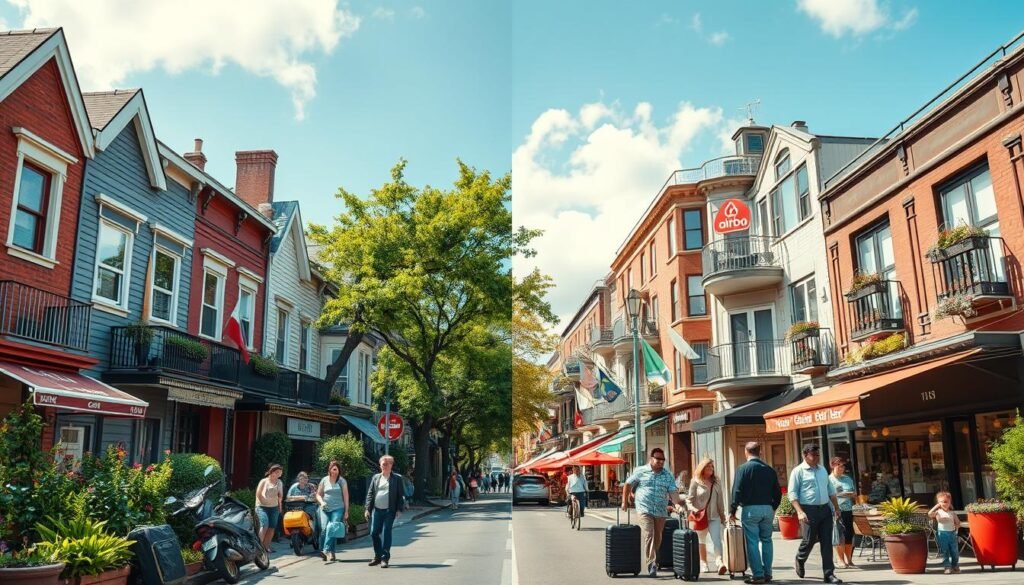
Regulatory Responses to Airbnb
As the influence of short-term rentals like Airbnb continues to grow in urban housing markets, local governments have implemented various regulatory measures to address the impact on rental prices and housing supply. These regulatory responses aim to strike a balance between supporting the benefits of short-term rentals and mitigating the potential negative consequences for long-term residents.
Overview of City Regulations
Cities have taken diverse approaches to regulating short-term rentals, ranging from outright bans to permitting and licensing systems. Some municipalities require short-term rental operators to obtain permits and comply with zoning restrictions, while others have implemented registration and taxation programs. The goal is to ensure that short-term rentals are operating within legal frameworks and contributing their fair share to the local economy.
Impact of Legislation on Rental Market
The implementation of short-term rental regulations has had a tangible impact on urban housing markets. In cities where stricter rules have been enforced, research has shown a decline in the number of Airbnb listings and a subsequent stabilization or even reduction in rental prices. Conversely, in areas with more lenient regulations, the proliferation of short-term rentals has been linked to increased rental costs and reduced housing availability for long-term residents.
Case Studies of Successful Regulations
Some cities have managed to strike a balance between the benefits and challenges of short-term rentals through innovative regulatory approaches. For example, New York City’s regulations have focused on limiting the number of days a host can rent out their property, while San Francisco has implemented a registration system and enforcement mechanisms to ensure compliance. These regulatory models have demonstrated the potential for managing the impact of short-term rentals on urban housing in a sustainable manner.
| City | Regulatory Approach | Impact on Rental Market |
|---|---|---|
| New York City | Limit on rental days, registration system | Stabilization of rental prices, reduced Airbnb listings |
| San Francisco | Registration system, enforcement mechanisms | Moderate impact on rental prices, some reduction in Airbnb listings |
As the short-term rental market continues to evolve, cities will need to adapt their regulatory approaches to address the unique challenges and opportunities presented by platforms like Airbnb. Striking the right balance between supporting innovation and protecting the long-term affordability of urban housing will be a key priority for policymakers in the years to come.

Landlords and Investors' Perspectives
In the rapidly evolving vacation rentals landscape, landlords and investors have emerged as key players, actively shaping the rental market and real estate trends. Their motivations, financial incentives, and experiences provide valuable insights into the dynamics driving the short-term rental industry.
Motivations Behind Listing on Airbnb
Landlords and investors have embraced Airbnb and other short-term rental platforms as a means to maximize their property’s earning potential. By offering their units as vacation rentals, they can capitalize on the growing demand for unique, flexible accommodations, often commanding higher nightly rates compared to traditional long-term leases.
Financial Incentives for Short-Term Rentals
- Increased revenue potential: Short-term rentals can generate significantly higher income than long-term leases, especially in popular tourist destinations.
- Flexibility in pricing and occupancy: Landlords can dynamically adjust rates based on demand, occupancy, and seasonal fluctuations.
- Reduced vacancy periods: Vacation rentals can minimize the downtime between tenants, ensuring a more consistent revenue stream.
Experiences from Property Managers
Property managers have played a crucial role in facilitating the growth of the short-term rental market. They offer landlords and investors a comprehensive suite of services, from listing management and guest screening to maintenance and cleaning. These professionals have gained valuable insights into the challenges and opportunities presented by the Airbnb era.
| Key Insights from Property Managers | Strategies for Successful Airbnb Listings |
|---|---|
|
|
As the vacation rentals market continues to evolve, landlords and investors are increasingly aligning their strategies to capitalize on the opportunities presented by Airbnb and similar platforms. Their perspectives shed light on the shifting dynamics of the rental market and real estate trends.
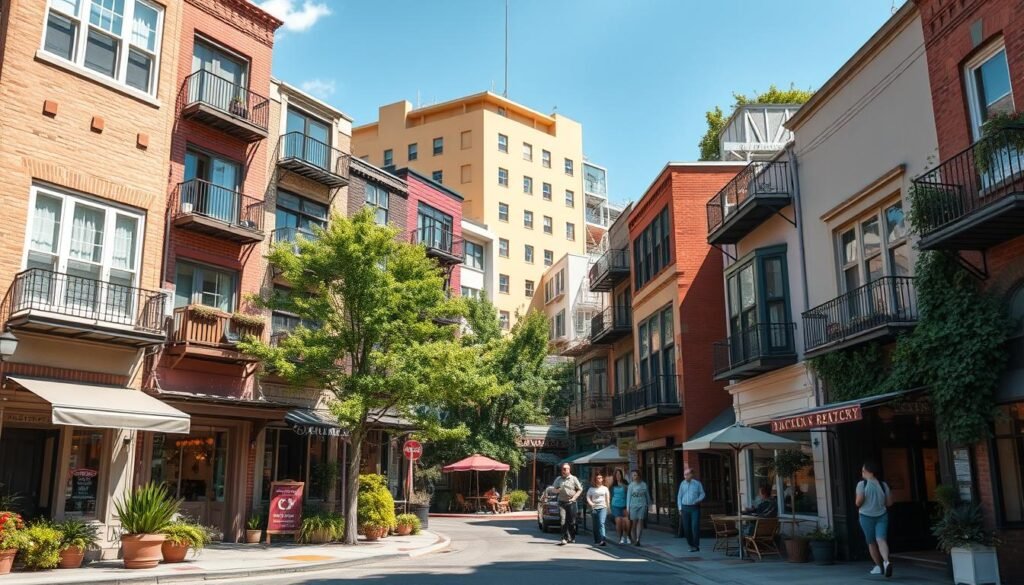
The Local Community's Reaction
As Airbnb’s presence continues to expand in urban areas, the local community’s reaction has become a pivotal aspect of the ongoing debate surrounding housing affordability and gentrification. Residents across various cities have expressed growing concerns about the impact of short-term rentals on their neighborhoods.
Resident Opposition to Airbnb Expansion
Many community members have voiced their opposition to the unchecked growth of Airbnb listings, citing concerns about the loss of long-term housing stock, increased rental prices, and the disruption of residential neighborhoods. Residents argue that the conversion of units to short-term rentals reduces the availability of affordable housing, making it increasingly challenging for local families to find and maintain secure and affordable living arrangements.
Community Benefits and Drawbacks
- Proponents of Airbnb claim that the platform provides economic benefits to hosts and supports local businesses, contributing to the vibrancy of urban communities.
- Critics, however, argue that the influx of short-term renters can lead to increased noise, parking issues, and a loss of community cohesion, as neighborhoods become more transient in nature.
Advocacy for Affordable Housing
In response to the perceived threats posed by Airbnb’s expansion, many local communities have mobilized to advocate for policies and regulations that prioritize the preservation and development of affordable housing. Grassroots organizations and tenant unions are working to ensure that housing affordability remains a key consideration as cities grapple with the challenges of urban housing and gentrification.
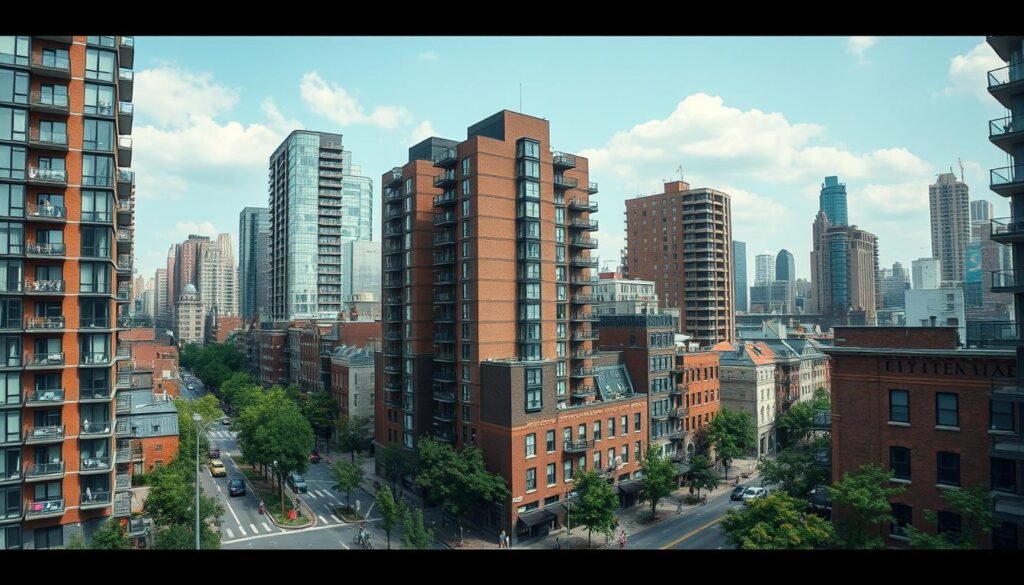
The local community’s reaction to Airbnb’s growth highlights the complex interplay between the platform’s economic impacts and the pressing need to address housing affordability in urban areas. As the debate continues, policymakers and community stakeholders must seek balanced solutions that protect the interests of both residents and the short-term rental industry.
Comparative Analysis: Airbnb vs. Hotels
As the vacation rentals market continues to evolve, it’s crucial to understand the dynamic between Airbnb and traditional hotels. This comparative analysis examines the price competition implications, shifts in market share, and the broader effects on the hospitality industry.
Price Competition Implications
Airbnb’s entry into the hospitality sector has introduced new pricing dynamics. Short-term rentals often offer more affordable options compared to traditional hotel rates, particularly in popular tourist destinations. This price competition has prompted hotels to reevaluate their pricing strategies, leading to more competitive pricing and greater value for consumers.
Market Share and Visitor Preferences
The rise of Airbnb has also influenced market share and visitor preferences. Travelers are increasingly drawn to the unique experiences and personalized accommodations offered by Airbnb, leading to a shift in market share away from traditional hotels. This shift in preference has significant implications for the hospitality industry, requiring hotels to adapt their offerings to meet evolving consumer demands.
Effects on Hospitality Industry
The Airbnb impact extends beyond price and market share, affecting the broader hospitality industry. Hotels have had to reevaluate their business models, invest in technological innovations, and enhance their guest experience to remain competitive. This disruption has also led to regulatory challenges, as policymakers grapple with the implications of the short-term rental industry on urban housing and local communities.
| Metric | Airbnb | Hotels |
|---|---|---|
| Average Nightly Rate | $100 | $150 |
| Market Share | 35% | 65% |
| Guest Satisfaction | 4.7 out of 5 | 4.2 out of 5 |

“The rise of Airbnb has fundamentally shifted the hospitality landscape, forcing hotels to rethink their strategies and adapt to the evolving preferences of modern travelers.”
Analysis of Airbnb's Economic Impact
Airbnb’s rise as a leading short-term rental platform has had a significant impact on local economies across the urban housing market. By providing an alternative to traditional hotels, Airbnb has introduced new economic dynamics that are worth exploring.
Job Creation and Local Economy Boost
One of the key economic benefits of Airbnb’s growth has been its ability to create jobs and boost local economies. The platform has enabled individuals to earn additional income by hosting guests in their homes, and has also led to the development of support services, such as cleaning and property management. This has created new employment opportunities and supplemental income for many residents in urban areas.
Tax Revenue for Local Governments
Airbnb’s operations have also generated tax revenue for local governments. Many cities and municipalities have implemented regulations that require Airbnb hosts to collect and remit occupancy taxes, similar to those imposed on traditional hotels. This additional tax revenue can be used to fund public services and infrastructure projects, benefiting the local community.
Case Studies of Economic Impact
The economic impact of Airbnb has varied across different cities and regions. In some cases, Airbnb’s presence has been a boon for local economies, while in others, it has contributed to challenges in the rental market. For example, a study in New York City found that Airbnb listings led to a 1.5% increase in rents, while a study in Los Angeles revealed that Airbnb listings generated over $300 million in economic activity and supported nearly 1,700 jobs.
| City | Economic Impact | Job Creation | Tax Revenue |
|---|---|---|---|
| New York City | 1.5% increase in rents | N/A | N/A |
| Los Angeles | $300 million in economic activity | 1,700 jobs | N/A |
As the rental market and urban housing dynamics continue to evolve, understanding the economic impact of platforms like Airbnb will be crucial for policymakers and urban planners seeking to address the challenges and opportunities presented by the changing landscape.

Challenges Associated with Airbnb Growth
The rapid rise of Airbnb and other short-term rental platforms has brought significant changes to urban housing dynamics, but with these changes come a range of challenges that communities must navigate. From the impact on local infrastructure to the strain on public services, and even environmental concerns, the growth of Airbnb has presented a complex set of issues for policymakers and residents alike.
Impact on Local Infrastructure
The influx of visitors utilizing Airbnb accommodations can put significant strain on a city’s infrastructure, from overcrowded streets and parking shortages to increased demand for utilities and public transportation. As more properties are converted from long-term housing to short-term rentals, neighborhoods may experience a change in character, with residential areas becoming more akin to transient hotel zones.
Strain on Public Services
The surge in Airbnb usage can also create challenges for local governments in terms of providing adequate public services. Emergency response teams, sanitation services, and law enforcement may face increased workloads as they respond to issues related to short-term rentals, such as noise complaints, waste management, and security concerns. This can stretch already limited municipal budgets and resources.
Environmental Concerns
The environmental impact of Airbnb’s growth is also a growing concern. The increased travel and transportation associated with short-term rentals can contribute to higher carbon emissions and energy consumption, particularly in popular tourist destinations. Additionally, the conversion of residential properties into short-term rentals can reduce the availability of affordable housing, leading to increased urban sprawl and further environmental implications.
As Airbnb continues to expand, balancing the benefits of tourism and economic growth with the needs of local communities will be a critical challenge for policymakers and urban planners. Addressing these complex issues will require a thoughtful, multifaceted approach that considers the diverse perspectives of all stakeholders.
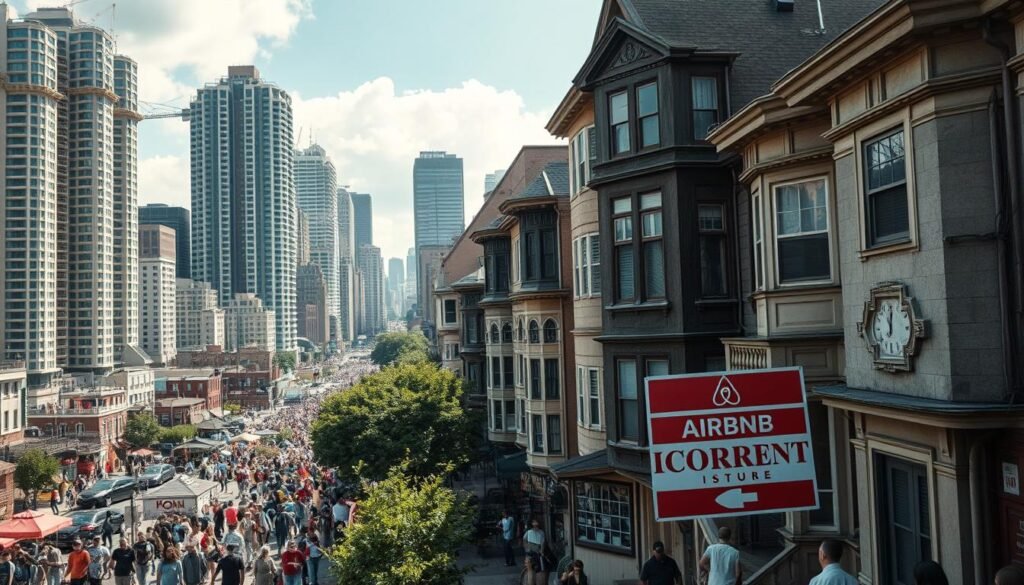
Future Trends in Short-Term Rentals
As the vacation rentals and home-sharing platforms industry continues to evolve, experts predict several key trends that will shape the future of short-term rentals. From Airbnb’s evolving market position to technological advancements in booking systems and changing traveler behaviors, the landscape of the real estate industry is set for significant transformations.
Predictions for Airbnb's Market Position
Airbnb, the pioneering home-sharing platform, is expected to maintain its dominant position in the short-term rental market. However, industry analysts foresee increased competition from other players, including established hotel chains and specialized vacation rental companies. Airbnb’s ability to adapt to regulatory changes and diversify its offerings will be crucial in retaining its market share.
Technological Innovations in Booking
The vacation rentals sector is poised to witness innovative advancements in booking and reservation systems. Travelers will likely enjoy more seamless, user-friendly experiences when searching for and securing their short-term accommodations. Artificial intelligence, virtual reality, and mobile-friendly platforms are some of the technological trends that could revolutionize the booking process.
Changes in Traveler Behavior
The preferences and behaviors of travelers are also anticipated to evolve in the coming years. As the demand for unique, local experiences continues to grow, short-term rental providers will need to cater to these shifting needs. Increased emphasis on sustainable tourism, remote work, and multigenerational travel may drive new trends in the home-sharing industry.
Overall, the future of short-term rentals promises a dynamic and rapidly changing landscape, with Airbnb and its competitors vying for a larger share of the vacation rentals market. Technological advancements and shifting traveler behavior will play a crucial role in shaping the industry’s trajectory.
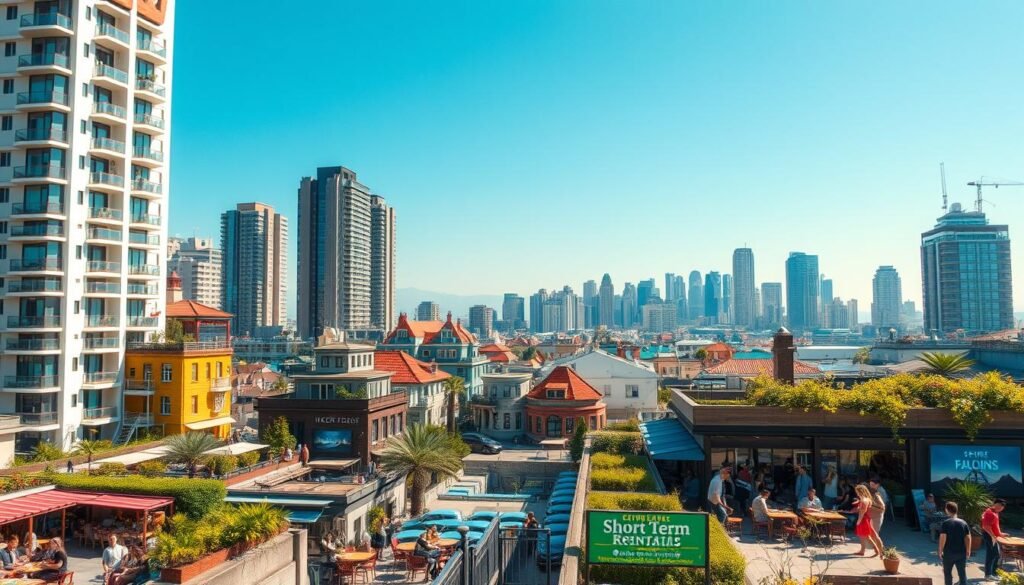
| Trend | Description | Impact |
|---|---|---|
| Airbnb’s Market Position | Airbnb to maintain dominance, but face increased competition from other players | Airbnb will need to adapt and diversify to retain market share |
| Technological Innovations | Advancements in booking systems, including AI, VR, and mobile-friendly platforms | Improved user experience and more seamless booking process for travelers |
| Changing Traveler Behavior | Increased demand for unique, local experiences, sustainable tourism, remote work, and multigenerational travel | Short-term rental providers must cater to these evolving traveler preferences |
Alternative Platforms to Airbnb
While Airbnb has dominated the home-sharing platforms market, a growing number of competitors have emerged in the vacation rentals landscape. These alternative rental services offer travelers diverse options and challenge Airbnb’s market position, ultimately impacting the broader rental market.
Overview of Competing Rental Services
Some of the prominent home-sharing platforms vying for a share of the vacation rentals market include VRBO, HomeAway, and Booking.com. These platforms offer a wide range of properties, from cozy apartments to luxurious villas, catering to various traveler preferences and budgets. Additionally, specialized rental services, such as Outdoorsy for RV rentals and Hipcamp for unique camping experiences, have gained traction in recent years, providing travelers with more niche options.
Impact of Competitors on the Market
The rise of these alternative home-sharing platforms has introduced more competition in the vacation rentals market. Travelers now have increased choice, leading to greater price transparency and potentially more competitive rates. This competition has also prompted Airbnb to continuously innovate and enhance its offerings, benefiting consumers. Moreover, the growing diversity of rental options has expanded the overall market, making vacation rentals more accessible to a broader range of travelers.
Specialized Rental Platforms
Beyond the mainstream home-sharing platforms, a new generation of specialized rental services has emerged to cater to specific traveler preferences. For instance, Outdoorsy focuses on recreational vehicle (RV) rentals, providing adventurous travelers with the opportunity to explore the great outdoors in unique mobile accommodations. Similarly, Hipcamp connects campers with private landowners, offering a diverse range of camping experiences, from glamping to off-grid retreats. These specialized platforms diversify the rental market and offer consumers more specialized and differentiated choices.
| Platform | Specialty | Unique Features |
|---|---|---|
| VRBO | Vacation Rentals | Extensive property listings, flexible booking options |
| Outdoorsy | RV Rentals | Wide selection of RVs, comprehensive insurance coverage |
| Hipcamp | Camping Experiences | Unique camping sites on private land, focus on outdoor adventures |
The emergence of these alternative home-sharing platforms and specialized rental services has introduced more competition in the vacation rentals market, benefiting travelers with greater choice and potentially more competitive rates. As the rental landscape continues to evolve, it will be interesting to see how these competitors shape the future of the home-sharing industry.
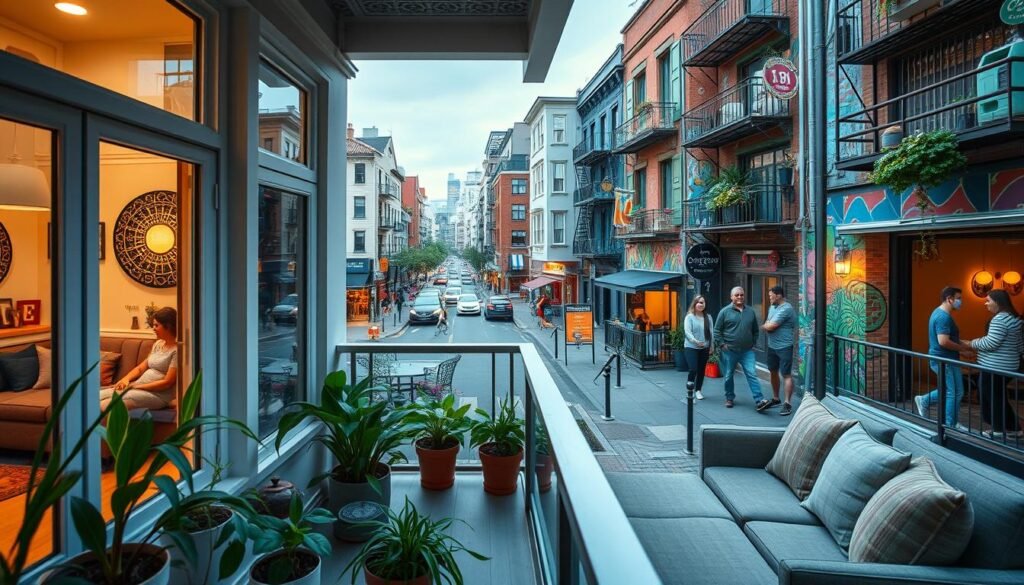
Strategies for Mitigating Rental Price Increases
As housing affordability continues to be a pressing issue in urban areas, city governments and communities are exploring innovative strategies to address the rising rental prices. From local government interventions to community-driven housing solutions, these efforts aim to create more accessible and sustainable rental markets.
Local Government Interventions
Many cities have implemented policies to regulate the short-term rental market and mitigate the impact of platforms like Airbnb on rental prices. These interventions include limiting the number of days a property can be rented out, requiring hosts to obtain permits or licenses, and imposing taxes on short-term rental income. Such measures can help preserve long-term rental housing stock and prevent the conversion of residential units into de facto hotels.
Innovative Housing Solutions
In addition to regulatory approaches, urban centers are also exploring alternative housing models to increase the supply of affordable rental units. This includes the development of affordable housing units, the expansion of community land trusts, and the promotion of accessory dwelling units (ADUs) and other forms of secondary housing. These innovative solutions can provide more diverse and accessible housing options for residents, especially those with lower incomes.
Community Engagement Efforts
Addressing the housing affordability crisis also requires active engagement with local communities. Policymakers are collaborating with community organizations, tenant advocates, and housing experts to gather input, identify challenges, and develop tailored solutions. This collaborative approach ensures that the needs and concerns of residents are prioritized in the decision-making process, fostering more inclusive and equitable housing policies.
By implementing a multifaceted approach that combines government interventions, innovative housing solutions, and community engagement, cities can work towards mitigating the rental price increases and improving housing affordability for urban housing residents.
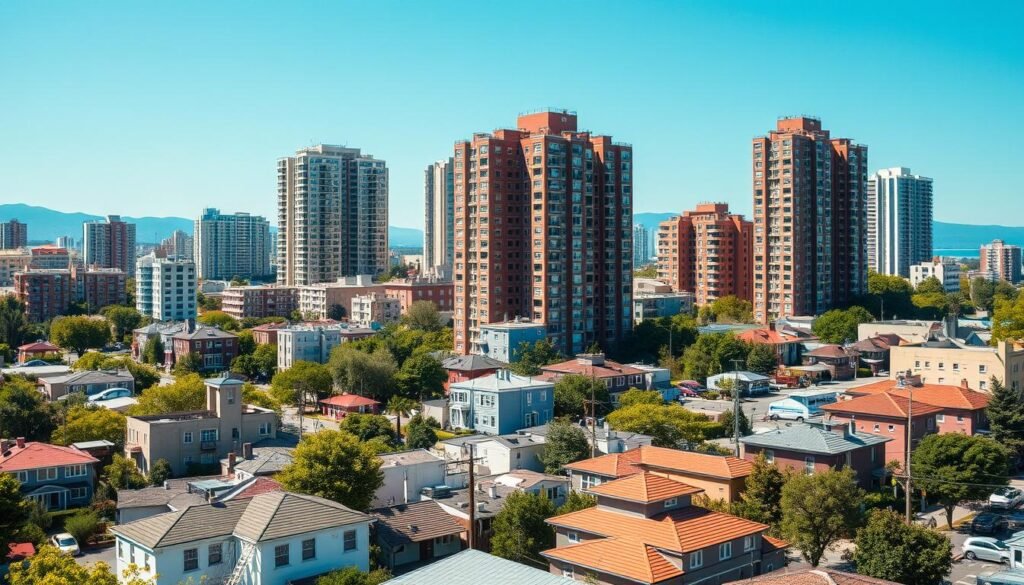
“Affordable housing is not just a housing issue, it’s a community issue. We need to work together to find solutions that work for everyone.”- Jane Doe, Housing Advocacy Group
Conclusion and Recommendations
The analysis presented in this article has shed light on the significant impact that Airbnb and the rise of short-term rentals have had on urban housing costs. The growth of this market has disrupted traditional rental dynamics, leading to concerns over housing affordability and accessibility, particularly in high-demand areas.
Summary of Findings
The data and case studies examined in this article demonstrate that the proliferation of Airbnb listings has contributed to increases in rental prices in many cities. The conversion of long-term housing units to short-term rentals, coupled with the gentrification effects of Airbnb’s presence, have reduced the overall supply of affordable housing options for local residents.
Suggested Policies for Sustainable Development
To address these challenges, policymakers should consider implementing a range of regulatory measures, such as restrictions on short-term rental listings, mandatory registration and licensing requirements, and increased tax revenue from Airbnb hosts. Additionally, innovative housing solutions, such as community land trusts and inclusionary zoning policies, can help preserve and expand the supply of affordable housing.
Future Research Directions
As the short-term rental market continues to evolve, further research is needed to understand the long-term implications for urban housing markets, the hospitality industry, and local communities. Exploring the impact of new technologies, the emergence of alternative rental platforms, and the changing preferences of travelers will be crucial in developing comprehensive strategies for sustainable development.
FAQ
What is Airbnb’s impact on urban housing costs?
Airbnb’s presence in urban housing markets has been linked to rising rental prices in many cities. The conversion of long-term rental units to short-term vacation rentals, as well as the gentrification effects in neighborhoods with a high concentration of Airbnb listings, have contributed to decreased housing affordability for local residents.
How has the growth of short-term rentals influenced the traditional rental market?
The rapid expansion of short-term vacation rentals, facilitated by platforms like Airbnb, has disrupted the traditional long-term rental market. Landlords and investors have increasingly converted properties from long-term rentals to short-term Airbnb listings, reducing the overall housing supply and driving up rents in many urban areas.
What economic factors contribute to rising rental prices in cities with a strong Airbnb presence?
Several economic factors, including supply-demand dynamics, urbanization trends, and the strength of local economies, have influenced rental price increases in cities with a significant Airbnb presence. The diversion of housing units from the long-term rental market, combined with rising demand for short-term vacation rentals, has put upward pressure on rents.
How have cities responded to the regulatory challenges posed by Airbnb?
Cities have implemented various regulatory measures to address the challenges posed by Airbnb’s growth, including restrictions on the number of days a property can be rented, registration and licensing requirements for short-term rental hosts, and increased enforcement efforts. The impact of these regulations on the rental market has varied, with some cities finding more success in balancing the needs of the tourism industry and housing affordability for local residents.
What are the perspectives of landlords and investors regarding the use of Airbnb for short-term rentals?
Landlords and investors have increasingly embraced Airbnb and other short-term rental platforms as a way to generate higher returns on their properties. The financial incentives of short-term rentals, including the ability to charge premium rates and maintain higher occupancy levels, have motivated many property owners to list their units on Airbnb rather than offering long-term leases.
How have local communities responded to the expansion of Airbnb in their neighborhoods?
Local communities have expressed a range of reactions to the growing presence of Airbnb in their neighborhoods. Some residents have voiced opposition to the influx of short-term rentals, citing concerns about noise, safety, and the erosion of community character. Others have advocated for affordable housing policies to mitigate the negative effects of Airbnb-driven gentrification on housing availability and affordability.
What are the key challenges associated with the continued growth of Airbnb and short-term rentals in urban areas?
The rapid expansion of Airbnb and short-term rentals has led to several challenges for urban areas, including strain on local infrastructure, increased demand for public services, and environmental concerns. Cities must balance the benefits of tourism and economic growth with the need to preserve the quality of life for residents and ensure the sustainability of local communities.
What strategies can be implemented to mitigate the impact of Airbnb on rising rental prices in cities?
Strategies to mitigate the impact of Airbnb on rising rental prices include local government interventions, such as implementing regulations, tax policies, and affordable housing initiatives; developing innovative housing solutions, like community land trusts and cooperative ownership models; and fostering community engagement efforts to ensure that the needs of local residents are prioritized.

